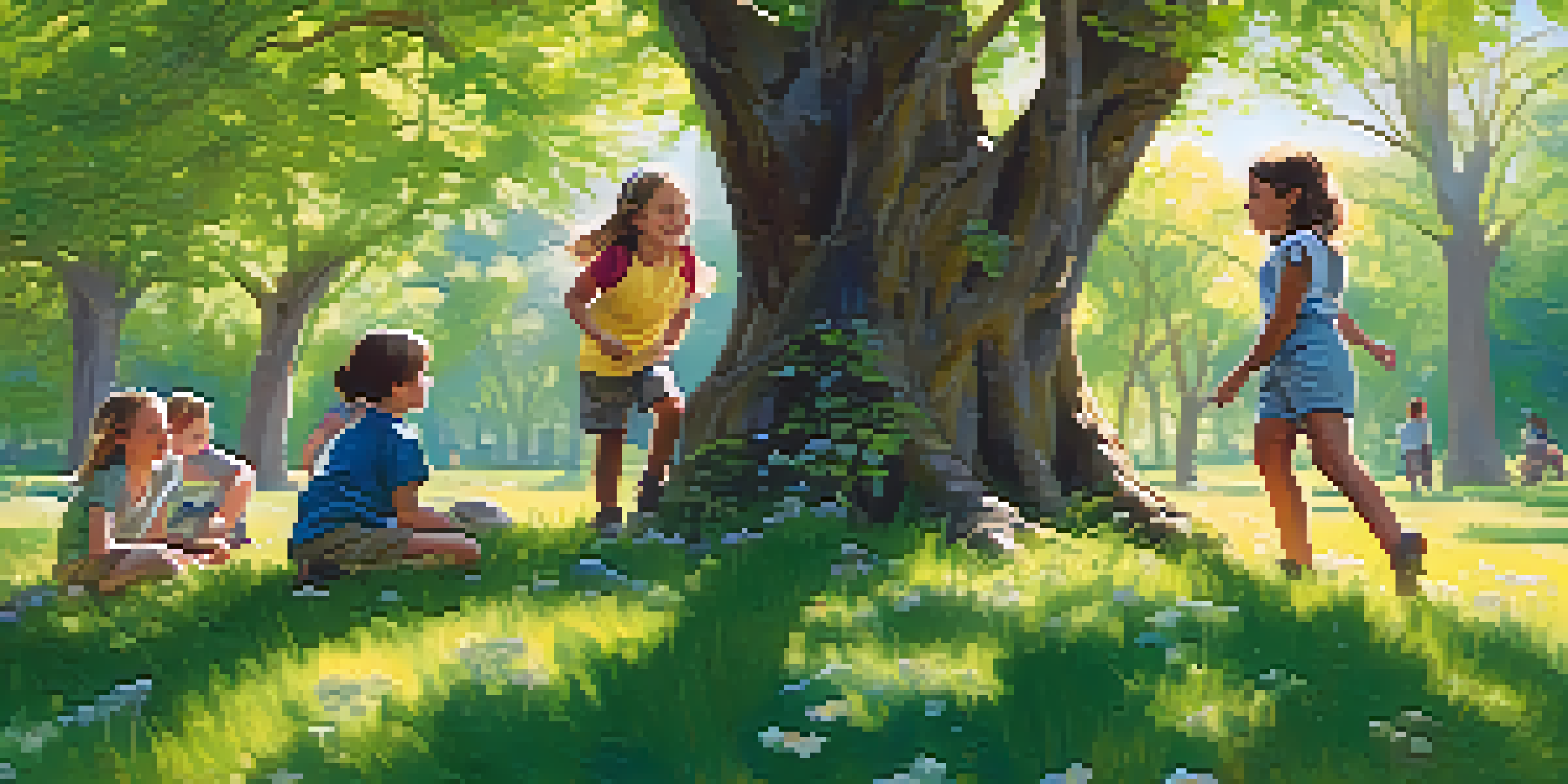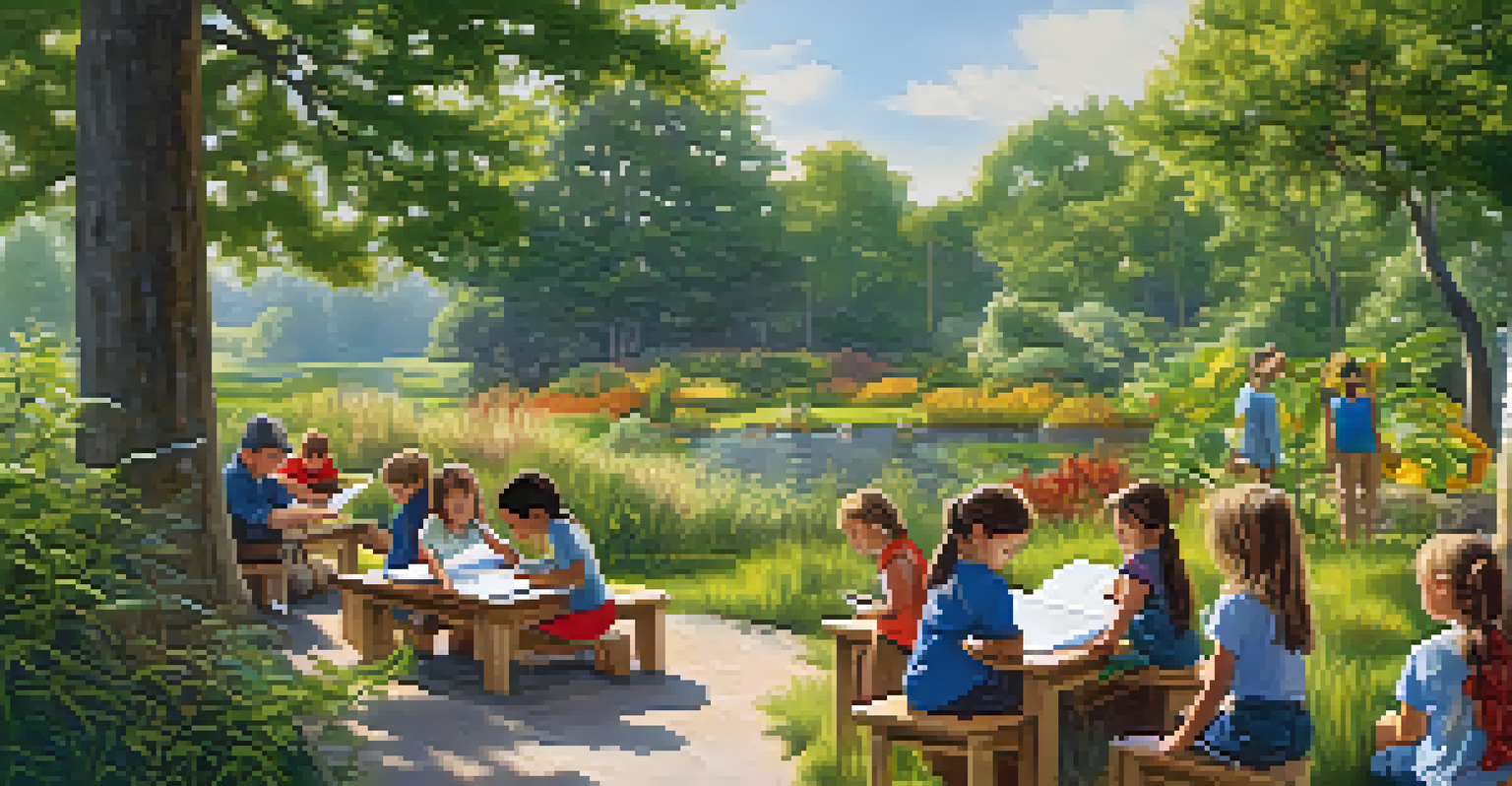Austin's Best Camps for Outdoor Education and Skills

Why Outdoor Education is Important for Kids
Outdoor education offers children unique opportunities to learn beyond the classroom. Being outside can enhance creativity, foster teamwork, and instill a sense of responsibility for the environment. These experiences help kids develop essential life skills that can benefit them for years to come.
The greatest threat to our planet is the belief that someone else will save it.
Engaging in outdoor activities allows children to connect with nature, which has been shown to improve mental health and well-being. Whether it’s climbing a tree or identifying local wildlife, these activities promote physical fitness and a healthier lifestyle. Plus, they learn to appreciate the beauty of the world around them.
Outdoor education also encourages problem-solving and critical thinking. Kids face challenges like navigating a trail or building a shelter, which can boost their confidence and independence. As they conquer these obstacles, they build resilience, an important trait that carries into adulthood.
Austin's Unique Natural Landscape for Learning
Austin is blessed with a diverse landscape, making it an ideal location for outdoor education. From the rolling hills of the Texas Hill Country to the serene waters of Lady Bird Lake, there's no shortage of beautiful settings for camps to operate. This variety allows camps to offer a wide range of activities, from hiking and kayaking to rock climbing.

The city's mild climate also means that outdoor camps can operate almost year-round, maximizing the learning opportunities for kids. Imagine exploring nature in the springtime wildflowers or enjoying a summer evening under the stars. The natural environment becomes a living classroom, offering lessons that textbooks simply can't provide.
Benefits of Outdoor Education
Outdoor education enhances creativity, teamwork, and responsibility, equipping kids with essential life skills.
Furthermore, Austin's vibrant community supports outdoor initiatives, with many organizations dedicated to environmental education. This collaborative spirit enhances the programs available, creating a rich tapestry of experiences for campers. Kids can learn not just about outdoor skills, but also about conservation and sustainability.
Top Outdoor Camps in Austin for Kids
One standout camp is the 'Austin Nature and Science Center,' which offers hands-on experiences with wildlife and nature. Children can participate in activities such as animal tracking and nature hikes, making science fun and engaging. This camp emphasizes the importance of ecological stewardship, shaping kids into environmentally-conscious adults.
The best way to predict the future is to create it.
Another popular choice is 'Camp Longhorn,' known for its scenic lakeside setting and diverse programming. From canoeing to archery, kids can try a variety of outdoor skills while making lifelong friends. The camp's philosophy centers around building character and confidence through challenging activities.
Lastly, 'The Trail Foundation's Outdoor Adventure Camp' focuses on enhancing outdoor skills while exploring the trails of Austin. Kids learn about local flora and fauna, trail maintenance, and navigation techniques. This camp not only promotes physical activity but also instills a sense of community among young outdoor enthusiasts.
The Role of Experienced Instructors in Camps
What sets these camps apart is the dedicated staff who guide and mentor the campers. Experienced instructors play a crucial role in creating a safe and supportive environment where kids can thrive. Their expertise ensures that activities are not only fun but also educational, making every moment valuable.
Instructors often come from various backgrounds, including education, outdoor leadership, and environmental science. This diversity enriches the camp experience, as kids are exposed to different perspectives and learning styles. A passionate instructor can ignite a child's interest in nature and outdoor skills, leaving a lasting impact.
Austin's Ideal Learning Environment
Austin's diverse natural landscape and supportive community create rich outdoor education opportunities for children.
Moreover, these mentors serve as role models, teaching important values such as teamwork, patience, and respect for nature. Kids often look up to their instructors, and the lessons learned through these interactions can shape their attitudes and behaviors long after camp ends.
Safety First: Ensuring a Secure Camp Experience
Safety is a top priority in outdoor education camps, and reputable programs take this responsibility seriously. Camps implement rigorous safety protocols to ensure that children can enjoy their adventures without unnecessary risks. This includes trained staff, first aid certification, and regular safety drills.
Additionally, camps often maintain small group sizes to foster close supervision and individual attention. This approach allows instructors to monitor each child's progress and provide guidance tailored to their needs. Parents can have peace of mind knowing that their children are in a secure and nurturing environment.
Moreover, camps emphasize the importance of teaching kids about personal safety in outdoor settings. From understanding wildlife encounters to practicing good hydration habits, campers learn skills that can keep them safe now and in the future. These lessons are invaluable, boosting both confidence and competence in outdoor activities.
How to Choose the Right Outdoor Camp for Your Child
Choosing the right outdoor camp for your child can feel overwhelming, but it’s all about matching your child’s interests and personality. Start by considering what activities they enjoy and how they prefer to learn. Camps often specialize in various themes, such as wildlife exploration or adventure sports, so look for one that aligns with your child's passions.
Don’t hesitate to reach out to camp directors with questions about their programs and philosophies. They can provide insight into daily schedules, safety measures, and instructor qualifications. Visiting the camp beforehand, if possible, can also give you a sense of the environment and help you assess whether it's a good fit.
Long-term Impact on Kids
Experiences gained from outdoor camps foster independence, resilience, and a lifelong appreciation for nature.
Lastly, consider the camp's values and approach to education. Look for programs that focus on character building and environmental stewardship. A camp that promotes teamwork, respect, and appreciation for nature will not only teach outdoor skills but also nurture your child's growth as a responsible and caring individual.
The Lasting Impact of Outdoor Education
The benefits of outdoor education extend far beyond the camp experience. Children who participate in these programs often develop a lifelong love for nature and outdoor activities. This passion can lead to healthier lifestyles, as they continue to seek out adventures and embrace physical activity in their daily lives.
Moreover, the skills learned at these camps can translate into various aspects of life, including leadership, resilience, and teamwork. Kids emerge from these experiences with a greater sense of independence and confidence, equipping them to tackle challenges both in and out of the classroom. They learn to adapt, think critically, and appreciate the value of collaboration.

Ultimately, outdoor education fosters a deep connection to the environment, nurturing future advocates for conservation. As kids grow into adults, the lessons learned at these camps inspire them to protect and preserve the natural world. This cycle of learning and stewardship ensures that future generations will continue to cherish and care for our planet.